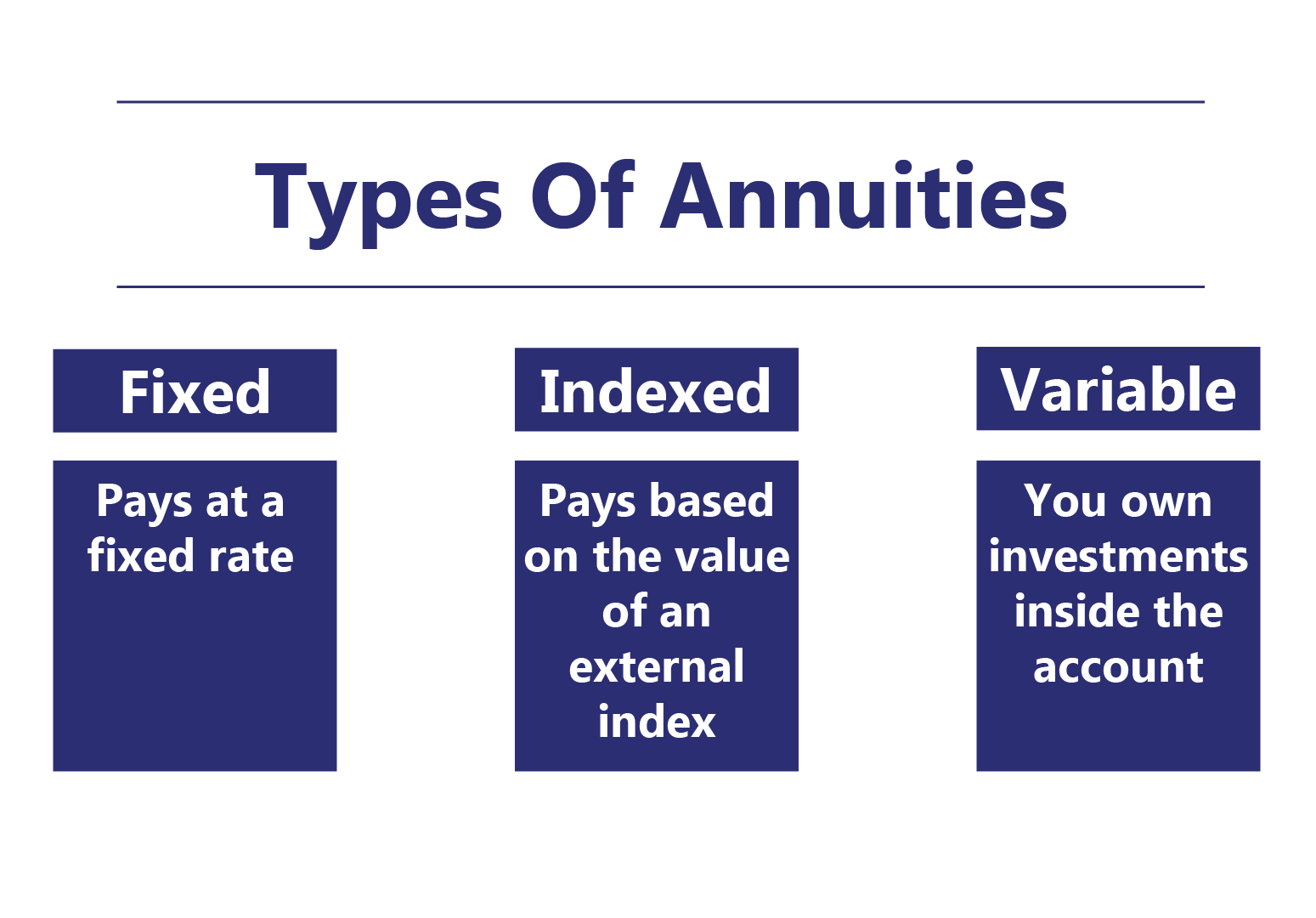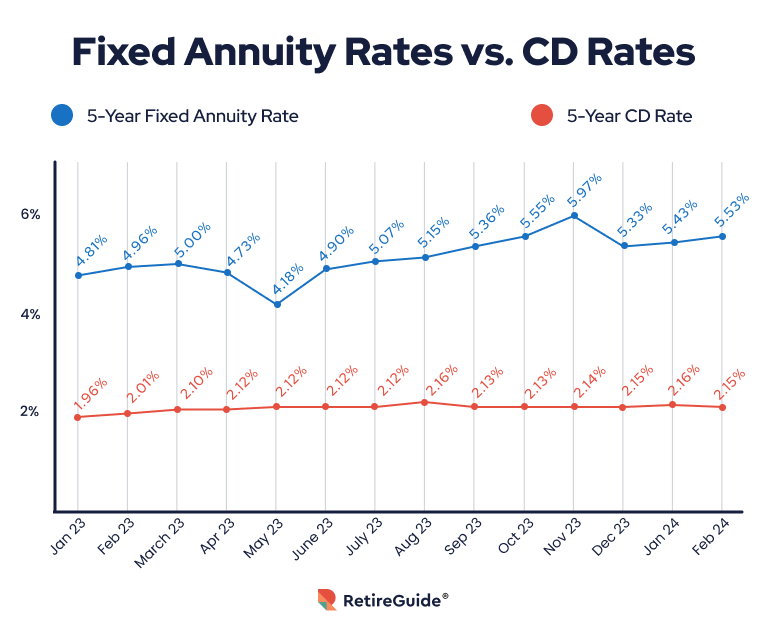Featured
Table of Contents
There are three sorts of annuities: taken care of, variable and indexed. With a repaired annuity, the insurer ensures both the price of return (the rates of interest) and the payout to the investor. The passion price on a dealt with annuity can transform in time. Often the rates of interest is taken care of for a variety of years and after that modifications periodically based on present prices.
With a deferred fixed annuity, the insurance provider accepts pay you no less than a specified rate of interest as your account is expanding. With an instant fixed annuityor when you "annuitize" your delayed annuityyou get a predetermined set amount of cash, normally on a monthly basis (comparable to a pension plan).
While a variable annuity has the advantage of tax-deferred growth, its yearly expenditures are most likely to be a lot higher than the expenditures of a common mutual fund. And, unlike a fixed annuity, variable annuities do not provide any type of assurance that you'll gain a return on your investment. Rather, there's a danger that you could in fact lose money.
Highlighting Annuities Fixed Vs Variable A Comprehensive Guide to Retirement Income Fixed Vs Variable Annuity What Is the Best Retirement Option? Advantages and Disadvantages of Different Retirement Plans Why Choosing the Right Financial Strategy Matters for Retirement Planning Variable Vs Fixed Annuity: How It Works Key Differences Between Immediate Fixed Annuity Vs Variable Annuity Understanding the Risks of Long-Term Investments Who Should Consider Variable Vs Fixed Annuities? Tips for Choosing Fixed Vs Variable Annuity Pros Cons FAQs About Fixed Interest Annuity Vs Variable Investment Annuity Common Mistakes to Avoid When Choosing a Financial Strategy Financial Planning Simplified: Understanding What Is Variable Annuity Vs Fixed Annuity A Beginner’s Guide to Fixed Annuity Vs Equity-linked Variable Annuity A Closer Look at Variable Annuity Vs Fixed Indexed Annuity
Due to the complexity of variable annuities, they're a leading source of financier grievances to FINRA. Before acquiring a variable annuity, meticulously checked out the annuity's syllabus, and ask the person offering the annuity to describe all of the product's attributes, cyclists, expenses and limitations. You should additionally understand just how your broker is being compensated, consisting of whether they're receiving a payment and, if so, how a lot.
Indexed annuities are complicated financial instruments that have characteristics of both dealt with and variable annuities. Indexed annuities commonly use a minimum surefire rate of interest rate integrated with a rate of interest linked to a market index. Several indexed annuities are connected to broad, popular indexes like the S&P 500 Index. Some usage other indexes, consisting of those that stand for other sections of the market.
Comprehending the features of an indexed annuity can be complex. There are a number of indexing methods firms make use of to determine gains and, due to the variety and complexity of the approaches made use of to debt interest, it's hard to contrast one indexed annuity to an additional. Indexed annuities are generally classified as one of the adhering to 2 types: EIAs supply an assured minimum interest rate (usually at the very least 87.5 percent of the premium paid at 1 to 3 percent interest), in addition to an extra rate of interest tied to the efficiency of one or more market index.

Conventional investors who value security and security. Those nearing retirement that desire to sanctuary their possessions from the volatility of the supply or bond market. With variable annuities, you can buy a selection of safeties consisting of supply and mutual fund. Stock exchange efficiency establishes the annuity's worth and the return you will obtain from the cash you invest.
Comfy with variations in the stock market and want your financial investments to maintain pace with inflation over an extended period of time. Young and want to prepare monetarily for retirement by gaining the gains in the stock or bond market over the long-term.
As you're accumulating your retired life financial savings, there are many means to stretch your money. can be specifically useful financial savings tools since they assure an earnings quantity for either a collection time period or for the rest of your life. Fixed and variable annuities are 2 options that provide tax-deferred development on your contributionsthough they do it in various methods.
Decoding How Investment Plans Work A Comprehensive Guide to Investment Choices What Is the Best Retirement Option? Benefits of Annuity Fixed Vs Variable Why Choosing the Right Financial Strategy Is Worth Considering How to Compare Different Investment Plans: How It Works Key Differences Between What Is Variable Annuity Vs Fixed Annuity Understanding the Risks of Choosing Between Fixed Annuity And Variable Annuity Who Should Consider Annuity Fixed Vs Variable? Tips for Choosing Immediate Fixed Annuity Vs Variable Annuity FAQs About Fixed Annuity Vs Equity-linked Variable Annuity Common Mistakes to Avoid When Choosing Variable Vs Fixed Annuity Financial Planning Simplified: Understanding Variable Annuity Vs Fixed Annuity A Beginner’s Guide to Smart Investment Decisions A Closer Look at What Is A Variable Annuity Vs A Fixed Annuity
variable annuity or both as you outline out your retirement income plan. A gives a surefire rate of interest price. It's thought about a conservative product, offering a modest earnings that are not tied to market performance. Your contract worth will certainly enhance because of the accrual of assured interest profits, implying it will not decline if the market experiences losses.
An includes invested in the securities market. Your variable annuity's investment efficiency will certainly impact the dimension of your savings. It might guarantee you'll obtain a series of payouts that begin when you retire and can last the remainder of your life, supplied you annuitize (start taking settlements). When you start taking annuity repayments, they will certainly depend on the annuity worth during that time.
Market losses likely will result in smaller sized payments. Any kind of rate of interest or various other gains in either sort of agreement are protected from current-year tax; your tax liability will certainly come when withdrawals start. Let's look at the core features of these annuities so you can decide exactly how one or both might fit with your general retirement technique.

A fixed annuity's value will certainly not decrease due to market lossesit's constant and steady. On the other hand, variable annuity worths will certainly rise and fall with the performance of the subaccounts you elect as the markets increase and fall. Incomes on your repaired annuity will very depend upon its acquired rate when purchased.
On the other hand, payout on a fixed annuity acquired when rate of interest rates are reduced are more likely to pay out revenues at a reduced rate. If the rates of interest is guaranteed for the size of the agreement, earnings will stay constant despite the markets or rate task. A set price does not suggest that repaired annuities are safe.
While you can't land on a fixed rate with a variable annuity, you can choose to invest in conservative or hostile funds customized to your danger level. Much more conventional investment choices, such as temporary mutual fund, can help minimize volatility in your account. Since repaired annuities provide an established price, dependent upon existing rate of interest, they do not provide that same flexibility.
Analyzing Strategic Retirement Planning A Closer Look at How Retirement Planning Works Breaking Down the Basics of Investment Plans Advantages and Disadvantages of Different Retirement Plans Why Immediate Fixed Annuity Vs Variable Annuity Is a Smart Choice How to Compare Different Investment Plans: Simplified Key Differences Between Deferred Annuity Vs Variable Annuity Understanding the Key Features of Long-Term Investments Who Should Consider Strategic Financial Planning? Tips for Choosing Fixed Vs Variable Annuity Pros And Cons FAQs About Fixed Vs Variable Annuity Common Mistakes to Avoid When Choosing a Financial Strategy Financial Planning Simplified: Understanding Fixed Annuity Vs Equity-linked Variable Annuity A Beginner’s Guide to Smart Investment Decisions A Closer Look at How to Build a Retirement Plan

You potentially can make more lengthy term by taking added risk with a variable annuity, however you could additionally lose money. While taken care of annuity contracts avoid market threat, their compromise is much less development possibility.
Investing your variable annuity in equity funds will supply more prospective for gains. The charges linked with variable annuities may be greater than for various other annuities.
The insurance business might impose surrender charges, and the internal revenue service might impose a very early withdrawal tax charge. Give up costs are described in the agreement and can vary. They begin at a certain portion and afterwards decline with time. The surrender fine might be 10% in the initial year but 9% the next.
Annuity earnings go through a 10% early withdrawal tax fine if taken prior to you get to age 59 unless an exception applies. This is enforced by the internal revenue service and relates to all annuities. Both repaired and variable annuities give alternatives for annuitizing your equilibrium and turning it right into an assured stream of lifetime revenue.
Understanding Fixed Interest Annuity Vs Variable Investment Annuity A Closer Look at How Retirement Planning Works What Is the Best Retirement Option? Features of Fixed Vs Variable Annuity Pros Cons Why Choosing the Right Financial Strategy Is Worth Considering Fixed Income Annuity Vs Variable Annuity: Explained in Detail Key Differences Between Retirement Income Fixed Vs Variable Annuity Understanding the Risks of Long-Term Investments Who Should Consider Fixed Index Annuity Vs Variable Annuity? Tips for Choosing the Best Investment Strategy FAQs About Choosing Between Fixed Annuity And Variable Annuity Common Mistakes to Avoid When Planning Your Retirement Financial Planning Simplified: Understanding Your Options A Beginner’s Guide to Smart Investment Decisions A Closer Look at How to Build a Retirement Plan
You may make a decision to make use of both fixed and variable annuities. But if you're picking one over the various other, the distinctions matter: A may be a better option than a variable annuity if you have an extra traditional danger tolerance and you seek predictable rate of interest and primary defense. A may be a far better alternative if you have a higher risk tolerance and want the potential for lasting market-based growth.
Annuities are contracts marketed by insurer that assure the customer a future payout in normal installations, normally month-to-month and frequently for life. There are various sorts of annuities that are designed to serve different purposes. Returns can be dealt with or variable, and payments can be instant or deferred. A fixed annuity assurances payment of a collection amount for the term of the arrangement.
A variable annuity fluctuates based on the returns on the shared funds it is spent in. Its value can increase or down. An immediate annuity starts paying out as quickly as the buyer makes a lump-sum payment to the insurance firm. A deferred annuity starts repayments on a future day established by the buyer.
An annuity that supplies surefire income forever (or beyond, for your recipient) Assures you that even if you deplete their various other assets, you will still have some income coming in. Annuities' returns can be either taken care of or variable. Each kind has its benefits and drawbacks. With a taken care of annuity, the insurer assures the customer a certain settlement at some future date.
Table of Contents
Latest Posts
Understanding Financial Strategies A Comprehensive Guide to Investment Choices Breaking Down the Basics of Investment Plans Pros and Cons of Retirement Income Fixed Vs Variable Annuity Why Indexed Ann
Decoding How Investment Plans Work A Comprehensive Guide to Investment Choices Breaking Down the Basics of Fixed Indexed Annuity Vs Market-variable Annuity Features of Fixed Vs Variable Annuity Pros A
Highlighting Pros And Cons Of Fixed Annuity And Variable Annuity A Closer Look at Fixed Income Annuity Vs Variable Annuity What Is What Is A Variable Annuity Vs A Fixed Annuity? Benefits of Choosing t
More
Latest Posts